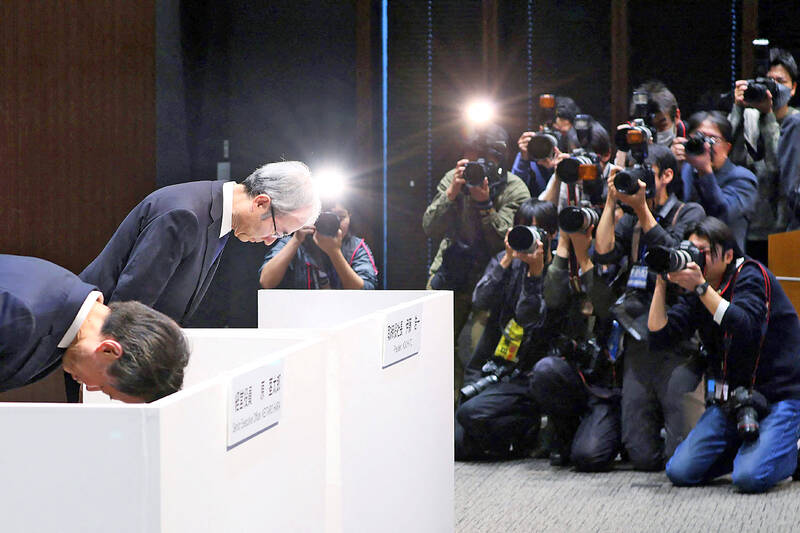Toyota Motor Corp is to temporarily suspend shipments of 10 vehicle models after supplier Toyota Industries Corp disclosed certification problems concerning some diesel engines.
An investigative committee found irregularities during horsepower-output testing that took measurements based on computer modules running software that ultimately differed from the software that was used for mass production, the Japanese automaker said in a statement yesterday.
The certification issue is the latest blow to beset Toyota, following an announcement by subsidiary Daihatsu Motor Co last month that most of its vehicles were not properly tested for collision safety and that the automaker manipulated the results of tests dating as far back as 1989. As a result, Daihatsu is halting shipments and suspending operations through at least next month.

Photo: AFP
“To move forward as a group it’s necessary to have a management system that values the voice of workers on the ground,” Toyota chief executive officer Koji Sato said, adding that data fabrication is an issue at the automaker’s subsidiaries as well as communication problems.
Toyota is to halt the production of the affected models in Japan immediately and stop the manufacture of impacted overseas models from today, Sato said, with production to restart on a country-specific basis.
The committee involved in the Toyota Industries issue found irregularities during horsepower-output testing for three engine models.
In total, 10 car models use the engines around the world, the company said.
Those include the Land Cruiser Prado, the Land Cruiser 300, the Fortuner and the Hilux.
The committee had initially been investigating Toyota Industries over certification related to engines used in forklifts. The latest findings came after the probe expanded to construction machinery engines and then diesel engines for cars.
“We weren’t communicating enough with Toyota Motor regarding the test process” after orders increased from 2017, Toyota Industries president Koichi Ito said, adding that he will seek to rebuild communications with the parent company.
The impact of the scandal on earnings is currently unknown, Ito said.
“Going forward, we will be involved in all company-wide activities to help rebuild Toyota Industries and review the situation to thoroughly ensure that safety and quality are the top priorities,” Toyota said in a statement.
The Japanese Ministry of Land, Infrastructure, Transport and Tourism is to start on-site inspections today.

With an approval rating of just two percent, Peruvian President Dina Boluarte might be the world’s most unpopular leader, according to pollsters. Protests greeted her rise to power 29 months ago, and have marked her entire term — joined by assorted scandals, investigations, controversies and a surge in gang violence. The 63-year-old is the target of a dozen probes, including for her alleged failure to declare gifts of luxury jewels and watches, a scandal inevitably dubbed “Rolexgate.” She is also under the microscope for a two-week undeclared absence for nose surgery — which she insists was medical, not cosmetic — and is

GROWING CONCERN: Some senior Trump administration officials opposed the UAE expansion over fears that another TSMC project could jeopardize its US investment Taiwan Semiconductor Manufacturing Co (TSMC, 台積電) is evaluating building an advanced production facility in the United Arab Emirates (UAE) and has discussed the possibility with officials in US President Donald Trump’s administration, people familiar with the matter said, in a potentially major bet on the Middle East that would only come to fruition with Washington’s approval. The company has had multiple meetings in the past few months with US Special Envoy to the Middle East Steve Witkoff and officials from MGX, an influential investment vehicle overseen by the UAE president’s brother, the people said. The conversations are a continuation of talks that

CAUTIOUS RECOVERY: While the manufacturing sector returned to growth amid the US-China trade truce, firms remain wary as uncertainty clouds the outlook, the CIER said The local manufacturing sector returned to expansion last month, as the official purchasing managers’ index (PMI) rose 2.1 points to 51.0, driven by a temporary easing in US-China trade tensions, the Chung-Hua Institution for Economic Research (CIER, 中華經濟研究院) said yesterday. The PMI gauges the health of the manufacturing industry, with readings above 50 indicating expansion and those below 50 signaling contraction. “Firms are not as pessimistic as they were in April, but they remain far from optimistic,” CIER president Lien Hsien-ming (連賢明) said at a news conference. The full impact of US tariff decisions is unlikely to become clear until later this month

Nintendo Co hopes to match the runaway success of the Switch when its leveled-up new console hits shelves on Thursday, with strong early sales expected despite the gadget’s high price. Featuring a bigger screen and more processing power, the Switch 2 is an upgrade to its predecessor, which has sold 152 million units since launching in 2017 — making it the third-best-selling video game console of all time. However, despite buzz among fans and robust demand for pre-orders, headwinds for Nintendo include uncertainty over US trade tariffs and whether enough people are willing to shell out. The Switch 2 “is priced relatively high”